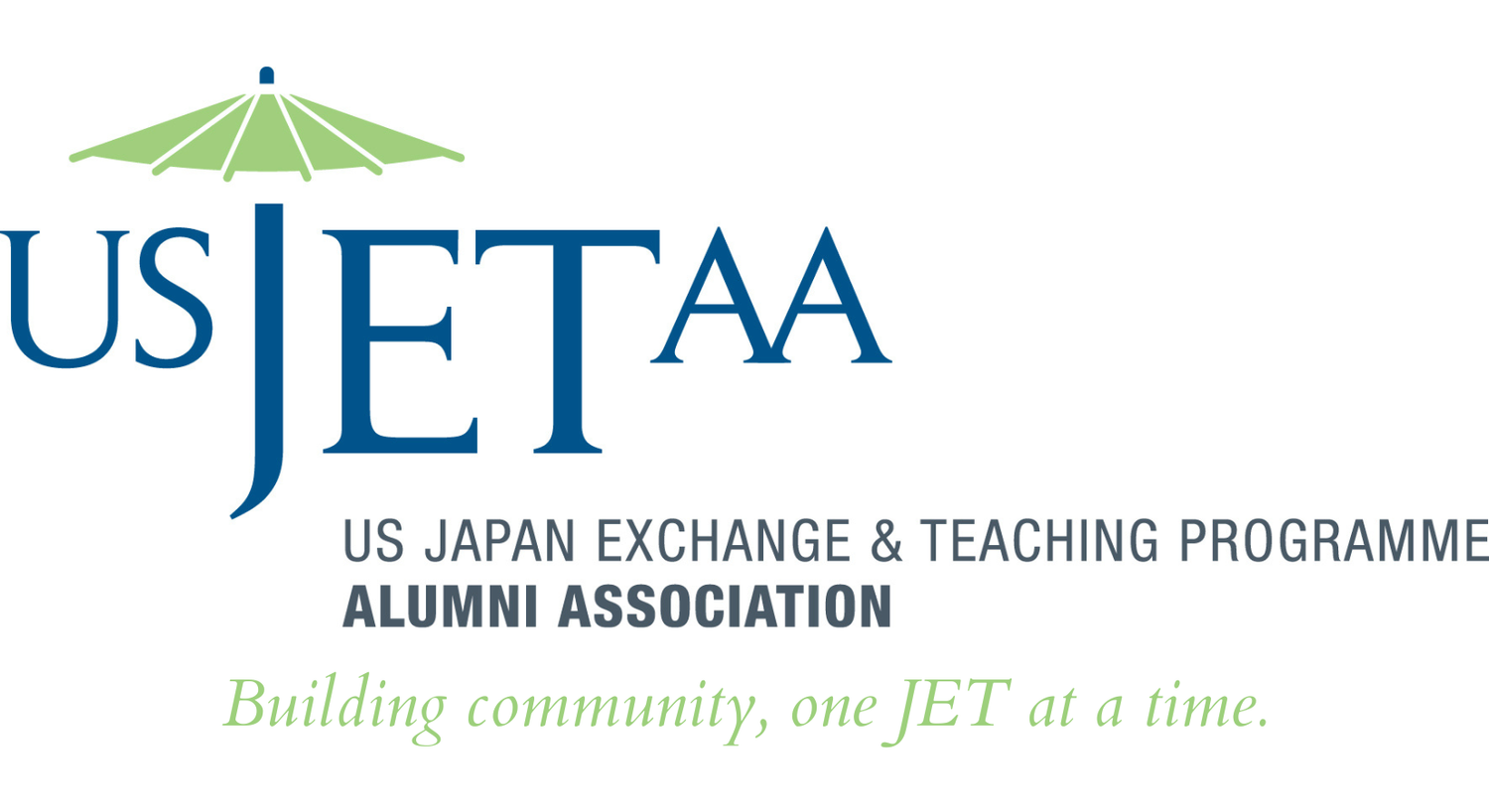The JET Academic Who Takes on Tough Topics
Celesté Holmes-Tate (Ishikawa, 2016-2022)
Interviewed by Rashaad Jorden (Yamagata, 2008-2010 & Kochi, 2018-2020)
Celesté Holmes-Tate says she’s always trying to figure out what she wants to do.
She’s certainly done a lot. Celesté has, among other things, organized Black History Month events, obtained a Master’s degree in Japan, and served as a college lecturer.
And, oh yeah, she was an ALT in the JET Program for six years in Hakui City, Ishikawa Prefecture.
“There was never a dull moment,” Celesté said about her time on JET, which included a memorable moment during her orientation when she delivered a speech to the then-prefectural governor, Masanori Tanimoto.
New JET Orientation at Ishikawa Prefectural Office w/ Governor Tanimoto, 2016
“I thought he was completely unimpressed with my speech. But he gave us a nice kinpaku — a gold leaf case for our business cards. So we did something right.”
Celesté had certainly done enough right to put herself in a position to deliver a speech to a prominent local official in Japan. The JET Program was not her first rodeo in the country, having spent a year studying abroad at Kansai Gaidai University. She says her greatest memory of that year was being able to participate in a delegation that went to Hiroshima to meet a hibakusha, a survivor of the atomic bomb droppings.
After obtaining her Bachelor’s degree from Notre Dame of Maryland in her hometown of Baltimore in 2015, Celesté saw three options for herself: working on Capitol Hill in Washington, D.C., joining the Peace Corps, or going to Japan on the JET Program.
Upon realizing she didn’t like the direction partisan think tanks were going, she opted to accept a position on the JET Program because it had gotten back to her before the Peace Corps did. Celesté spent six years on JET in Ishikawa Prefecture, during which she co-founded Kanazawa Black History Month, an initiative that has included events such as analyses of films from Africa and the African diaspora, Caribbean and Kenyan cooking classes, and an annual Black cultures festival.
Kanazawa Black History Month in Kanazawa City, 2019
“I think it was a big release for us (Celesté and fellow co-founder, Michael Frazier) and other Black people who were living in Ishikawa,” she said. “These issues are universal, and in Japan, unfortunately, stereotypes and anti-Black views exist.”
Educating people in Japan about racial issues is something Celesté has taken very seriously. She served as the organizer of Black Lives Matter Tokyo, having been the chief editor of its website. The organization hosted a web series called Real Talk, which featured Black expats in Japan discussing their experiences and examined the mixed Black-Japanese identity, among other subjects.
“I think it was generally received quite well,” she said. “People would comment and say they did have these stereotypical views of Black people.”
“And through Black Lives Matter Tokyo, they were able to learn and have a different view.”
That includes her co-workers. Celesté once sent an article in Japanese to her JET Program supervisor, who had asked why Black people couldn’t protest peacefully in the wake of the murder of George Floyd, that explained the rampant police brutality in the U.S. and other forms of racism members of the Black community have faced for more than a century.
“She actually got back to me the next day — or maybe, a couple days later — and she said, ‘My view changed. I didn’t know about these things before and the long history of racism, people are fed up,’” Celesté said.
G7 Education Ministers’ Meeting Appreciation Ceremony at Kanzawa University, 2024
Following her time on JET, Celesté decided to further her education in Japan from Kanazawa University, where she conducted her thesis on Sudan’s ethnic conflict.
“What really attracted me to Sudan was the conflict of identity on the African continent between African and Arab identities,” she said.
As part of her research, she examined Sudan’s history and national identity, from the British colonial period to the ousting of its former president, Omar al-Bashir.
“I just found the topic of African vs. Arab identity, within the continent and its weaponization by political elites, to be a very important component and not very talked about.”
Celesté is currently studying for her PhD at the same institution. Her focus is on memory politics, including “how political leaders can use history and collective memory to fuel conflict between countries,” citing tensions between Japan and South Korea as an example.
She’s also researching the role of museums as “actors participating in these political discourses and trying to reconcile difficult history.” Celesté mentioned that Ishikawa’s Prefectural Museum of History has a sister museum exchange with a museum in Jeonju, South Korea. The two museums have a rotating exhibition every five years to showcase cultural property and shared heritage.
Cultural property “is a really big point of tension between the two countries,” Celesté said, considering the amount that was taken out of Korea during the colonial period. “But this museum exchange holds some potential for cross-border dialogue and confronting heritage issues between the two states.”
Last day as an ALT at Hakui High School, 2022
And to top it off, she’s working as a lecturer at the Kanazawa Welfare College. She teaches courses in, among other subjects, Business Economics and Business English to a largely non-Japanese cohort of students looking to break into fields such as nursing, hospitality, and carework.
That’s just one part of her extensive background in Japanese academia, a career that was made possible by the JET Program.
“Being in Hakui, Ishikawa Prefecture, I learned that Japan has so many diverse voices that don’t always align with what you hear from Tokyo. That’s normal in any country, but it was powerful to experience it firsthand,” Celesté said. “This perspective pushed me to think critically about whose voices get heard and whose don’t, and it shaped the way I approach my research on politics and international relations.”
“At the same time, JET gave me space to get involved outside the classroom, like co-organizing Kanazawa Black History Month and talking about expat life in Japan. Those experiences showed me how cultural events and grassroots efforts can create dialogue around difficult topics, and that’s something I now carry into my academic work.”
About Celesté Holmes-Tate (Ishikawa, 2016-2022)
Celesté M. Holmes-Tate is a PhD candidate in Politics and International Relations at Kanazawa University, Japan. Her research examines the role of non-state actors in Japan–South Korea memory politics, with a focus on how non-state institutions engage in political dialogue on colonial legacies. She also explores how state leaders, diaspora networks, and civil society groups shape narratives of conflict, peace, and reconciliation, particularly in East Asia and North Africa. Beyond academia, she has been active in public education and community organizing in Japan. She co-organizes Black History Month celebrations in Ishikawa Prefecture through Kanazawa Black History Month, coordinating events on African and African diaspora cultures. She also served as an organizer for Black Lives Matter Tokyo and was a speaker at the 2023 G7 Education Ministers’ Meeting, where she presented on the state of multicultural education programs in Japan and the G7. Celesté previously worked as an Assistant Language Teacher (ALT) in Ishikawa Prefecture (Hakui City) from 2016 to 2022.
The Senpai Spotlight series features JET alumni from the US who have made successful careers for themselves in various fields—with the goal of inspiring JETs and JET alumni to pursue their own dreams while also offering some words of advice only a senpai could know.
If you, or someone you know, would like to be featured as a Senpai Spotlight, please reach out to us at contact@usjetaa.org.
This edition of Senpai Spotlight was written by Rashaad Jorden, a two-time JET Program ALT (Yamagata, 2008-2010 & Kochi, 2018-2020). During his second JET stint, he was the General Sports Editor for AJET CONNECT Magazine. As working for CONNECT was one of the most enjoyable aspects of his JET experience, he’s eagerly contributing again to a community that he treasures.








